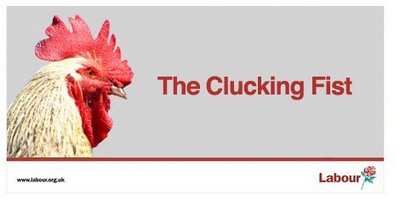The honeymoon's over.
 Well, that's that then. After two weeks of febrile, wildly over the top speculation that Brown was about to take the risk of calling an election, he, as the Guardian's leader today called for him to do, has put an end to it all. No trudging around in darkness as fireworks go off around and about for the activists of all parties, and only the blankness and dreary weather to look forward to for us sad, lonely political anoraks.
Well, that's that then. After two weeks of febrile, wildly over the top speculation that Brown was about to take the risk of calling an election, he, as the Guardian's leader today called for him to do, has put an end to it all. No trudging around in darkness as fireworks go off around and about for the activists of all parties, and only the blankness and dreary weather to look forward to for us sad, lonely political anoraks.As Nosemonkey also points out, the hyperbole now swirling around is also surely out of all proportion. Is this really in any way a crisis? While Brown's advisers and pollsters can most certainly be accused of hyping up the prospect of an early poll, and he did himself no favours whatsoever by bringing the announcement on NHS reform to Thursday and the spending review and pre-budget report to early next week, this is hardly the beginning of Brown's downfall. The honeymoon is certainly over, and that is more than partly his own fault, but the chances of the Tories now managing to keep themselves focused without once again falling into infighting are slim.
It's true this is a mess of Labour's own making, and Cameron will naturally try to exploit it as much as he can. How quickly though things change: at the beginning of the week this was "mission impossible" or "make or break" week for the Conservatives, while for now at least they look the stronger and more focused. Their job, far from challenging Brown to call an election, as they fatuously urged this week, was to make certain that he couldn't risk doing so, and in that they've succeeded. It doesn't seem to have been Cameron's speech wot won it however, but Osborne's uncosted and discriminatory inheritance tax proposals, which were far more of a dog whistle than anything that Brown put forward. Promising to cut a hugely unpopular tax that very few actually currently pay was enough to get those in the marginals and soft, well-off Lib Dems in the south-east to change sides, at least for the opinion polls'.
Those same opinion polls in reality offer very little comfort for Cameron. He's squandered a huge lead over the last few months; while everyone knew full well there would be a bounce for Brown once he took over, the Conservatives both managed to underestimate just how long it would last and to lose their faith in Cameron at the exact second as the polls for the first time turned against him. Even if Brown had thrown all caution to the wind and decided to take the Tories' on at their own game by seeking his own mandate, as they taunted him to do, the very best result the most optimistic current polls for the Tories predict is a hung parliament. The Liberal Democrats would almost certainly have then gone into some sort of coalition with Labour, despite their previous pledges not to do so: the possibilities of power would certainly be too much for the overwhelming majority of the party to resist.
In fact, such a result would have been overwhelmingly welcome. The shenanigans of the last two weeks have only confirmed what many have long feared: that the arrival of Brown, rather than heralding a return to the left, as the Tories scaremongered about, would if anything result in an even further shift of the political "centre ground" to the right. Brown's courtship of Paul Dacre, the supposed political weather vane of the middle classes has meant that the difference between Labour and the Tories has narrowed yet further. A popular new parlour game could be to guess how many policies they have that aren't almost exactly the same: the only differences this blogger can discern is that the Tories will scrap ID cards only to waste it on even more prison cells, keep the detention without charge limit for "terrorist suspects" at 28 days, shaft the single mother and those on incapacity benefit ever so slightly harder, and rob the super-rich to give to the already well-off. It's hardly 1983 all over again, is it?
Which would have only exacerbated the likelihood of an even poorer turn-out than last time, which increased by a massive 2% on the record low of 2001. A hung parliament could have helped change that: the Liberal Democrats could have demanded proportional representation in exchange for going into a coalition, ending once and for all the insanity of having to appeal to those who care only about what politicians are going to do for them, rather than for everyone. Ming could also have rightly followed up his call for fixed-term parliaments, putting a stop to any repeat of this week's exasperating charade. We've been denied that for now, but if there's no change in the lack of choice whenever the next election is called, the calls for the above are only going to inexorably grow.
Labels: Conservative party conference, David Cameron, election fever, Gordon Brown, Labour conference, Tories
Post a Comment